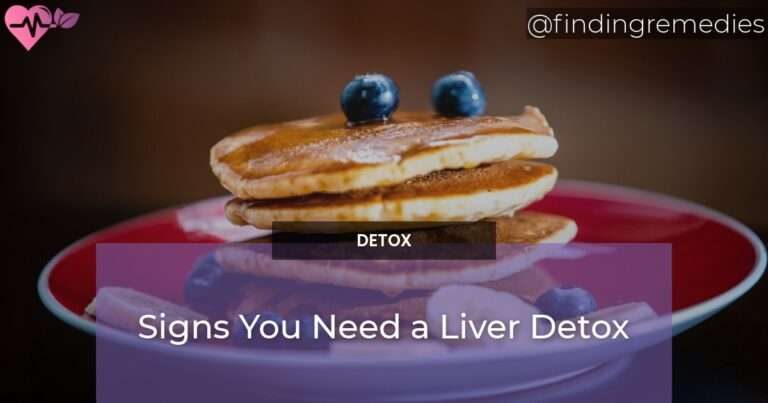As the saying goes, “An ounce of prevention is worth a pound of cure.” Despite our best efforts to stay healthy, sometimes our bodies need an extra boost to keep our organs functioning optimally. The liver is an often overlooked organ when it comes to our overall health, but it is one of the most important for our well-being. Be aware of the symptoms of liver toxicity. Liver is important because it not only does it help filter out toxins and chemicals from our bodies, but it also plays a role in digestion, metabolism, and immunity. When our liver becomes overloaded with toxins, it can be difficult to keep up with its natural detoxification process. The good news is that a liver detox can help restore balance and improve overall health.
In this article, we will discuss the symptoms of Liver Toxicity and signs that indicate that you may need a liver detox. We will also provide some tips for how to get started on a liver detox and the steps you can take to maintain a healthy liver.
Table of Contents
Symptoms of Liver Toxicity
If you’re experiencing any of the following symptoms, it may be a sign that you need a liver detox:
- Abdominal pain
- Nausea or vomiting
- Fatigue or weakness
- Jaundice (yellowing of the skin and eyes)
- Dark urine or pale stools
- Unexplained weight loss
- Loss of appetite
- Mental confusion or trouble concentrating
These symptoms may indicate liver toxicity, which can affect your overall health if left untreated. The liver plays a vital role in filtering toxins from your blood, so it’s important to address any issues with liver function.
Causes of Liver Toxicity
Several factors can contribute to liver toxicity, including:
- Excessive alcohol consumption
- Drug or medication use
- Poor diet
- Environmental toxins
- Genetic factors
- Infections such as hepatitis B or C
- Autoimmune disorders
Lifestyle choices such as alcohol consumption and a poor diet can increase your risk of liver toxicity. Exposure to environmental toxins such as pesticides and chemicals can also contribute to liver damage.
Importance of Liver Detox
Liver detoxification is essential for maintaining liver health and function. A liver detox can help to:
- Remove toxins from the liver
- Improve liver metabolism
- Reduce liver inflammation
- Regenerate liver cells
- Support liver function
By removing toxins from the liver, a detox can help to improve overall health and reduce the risk of liver disease.
ALSO READ
Natural Ways to Detox Your Liver
There are several natural ways to detoxify the liver, including:
- Incorporating liver-friendly foods into your diet, such as leafy greens, beets, and garlic
- Drinking plenty of water to flush out toxins
- Exercising regularly to improve liver function
- Reducing alcohol consumption
- Avoiding processed foods and sugar
- Getting enough sleep to allow the liver to rest and regenerate
By making these lifestyle changes and incorporating liver-friendly foods into your diet, you can support your liver and improve its function.
Foods to Avoid During Liver Detox
During a liver detox, it’s important to avoid certain foods that can contribute to liver toxicity, including:
- Fried foods
- Processed foods
- Sugar and artificial sweeteners
- Caffeine
- Alcohol
These foods can place a burden on the liver and make it more difficult to detoxify. Instead, focus on consuming whole, nutrient-dense foods to support liver function.
Foods to Consume During Liver Detox
There are several foods that can help to support liver function and aid in detoxification, including:
- Leafy greens such as kale and spinach
- Cruciferous vegetables such as broccoli and cauliflower
- Fruits such as berries and citrus fruits
- Garlic and onions
- Herbs such as turmeric and milk thistle
- Lean protein sources such as chicken and fish
By incorporating these foods into your diet, you can support liver function and aid in the detoxification process.
Supplements That Help Liver Detox
Several supplements can aid in liver detoxification, including:
- Milk thistle
- Dandelion root
- Turmeric
- Alpha-lipoic acid
- N-acetylcysteine (NAC)
These supplements can help to support liver function and aid in the detoxification process. Be sure to talk to your healthcare provider before taking any supplements, as they may interact with medications or have potential side effects.
Lifestyle Changes for Liver Health
In addition to making dietary changes and taking supplements, there are several lifestyle changes you can make to promote liver health, including:
- Reducing alcohol consumption
- Avoiding exposure to environmental toxins
- Getting regular exercise
- Managing stress levels
- Getting regular liver function tests
By making these lifestyle changes, you can reduce your risk of liver toxicity and promote liver health.
Duration of Liver Detox
The duration of a liver detox can vary depending on the individual and the severity of liver toxicity. In general, a liver detox may last anywhere from a few days to several weeks. It’s important to listen to your body and consult with a healthcare provider before beginning a liver detox.
When to Seek Medical Attention for Liver Problems
If you’re experiencing any warning signs of liver damage, it’s important to seek medical attention right away. These signs may include:
- Jaundice
- Abdominal pain or swelling
- Nausea or vomiting
- Unexplained weight loss or fatigue
- Changes in urine or stool color
There are several treatment options available for liver problems, including medications, lifestyle changes, and in severe cases, surgery. Early detection and treatment can help to prevent further liver damage and improve overall health.
In conclusion, liver detoxification is essential for maintaining liver health and function. By making dietary changes, taking supplements, and making lifestyle changes, you can support your liver and aid in the detoxification process.
RELATED ARTICLES:

